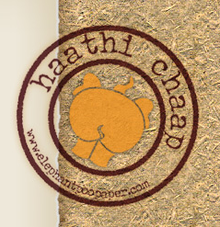Today, going green is considered a fad. From Page 3 Celebrities to recognised institutions, the green path is being explored by everybody. With entrepreneur Mahima Mehra from Haathi Chaap we explore what it takes to be a green entrepreneur and the challenges she has faced.
Literally meaning ‘Elephant imprint’ this brand of stationery products is made of elephant dung and was founded in Delhi in 2003. The paper was exported to Germany for the first four years and then launched in India in 2007.
What initially gave you the idea of starting Haathi Chaap?
I was always working with the sector of paper recycling and when I discovered that recycled paper could be made with elephant poo, it excited me as it was a good raw material. Once we (me and my team) began experimenting and researching about elephant poo paper that is when we discovered this was being done throughout the world by other people. So this wasn’t our original idea as such. The basic idea was to work with different and any kind of fibre which could be converted and Haathi Chaap was born when we figured out that elephant poo worked well to make recycled paper.
Has running a green business made you more eco-friendly?

How is being a ‘green’ entrepreneur different from being just an entrepreneur?
Green is restricted. Entrepreneurs can work anywhere in the world, do anything, but with green entrepreneurship it makes a lot of difference what raw materials you use, which effluents you create, so it’s more constrained. I haven’t classified myself into either of the two, so I can’t say how being a ‘green’ entrepreneur is different from being any other entrepreneur.
However, I believe that no entrepreneur can be completely green. If Haathi Chaap was completely green, then we’d treat our own water. Right now we don’t, we just make sure we don’t use any chemicals while making the paper.
What challenges have you faced, so far?
Although the products have been received wonderfully, and surprisingly enough more so in the Indian markets than the foreign markets, running a small scale industry comes with its issues. For starts, cohering with local people and getting them to work at a pace you need them to, is difficult. They don’t understand city pace and to satisfy your customer base, you need quick production. A big festival comes around and they take a leave to celebrate but you still need to meet weekly deadlines. You need to find a common understanding and sometimes you need to push people to work.
Do you believe green ventures are sustainable?
Green ventures are definitely sustainable. The very fact that Haathi Chaap is called a ‘green enterprise’ and that newer people are introduced to our eco-friendly products everyday along with the brand name, is a big step forward. It’s great to see people strike a chord with waste and when they realise that our products are made out of waste they too begin believing that something like this can be done, waste can be used. At the root of all such ventures is the idea, everything else just follows.
What kind of a market is India for green products?
In the Indian markets, there’s an ambiguity associated with what is green. There are no certifications stating that certain products are green, it’s just what is advocated as green is taken as green. So some products might be more eco-friendly in terms of the process used to produce them than others. People need to be educated about that and then we can perhaps classify products as 50% green or 100% green.
Do you believe the green trend is catching up in India?
From my experience, maybe when it comes to eating organic people might consider ‘green’ but when it comes to products especially stationery, people aren’t buying them because they are green, but because they are ‘funky’ or ‘good looking’ products. So yes, the trend might be growing but products still need to be competitive and although Haathi Chaap is the only company in India to make elephant poo paper, we do face tough competition other normal stationery products.
What is the way forward for you as a ‘green’ entrepreneur and for Haathi Chaap?
I want to experiment with different kinds of raw material and create user friendly products. If we find other fibres to make products with we might start other sister brands. As far as Haathi Chap goes, if you see our products are priced from Rs. 10 to Rs. 500, so that they are no exclusive and everybody from every class can buy them. We want everybody to use these products. Now we want to make them available easily and we’ve started selling them online at itokri.com and shopo.in. We plan to expand to 5 online stores soon.
Who would have thought that elephant poo can be used to manufacture paper products. She has done her job to keep ‘our nature’ green.
What’s your contribution?

